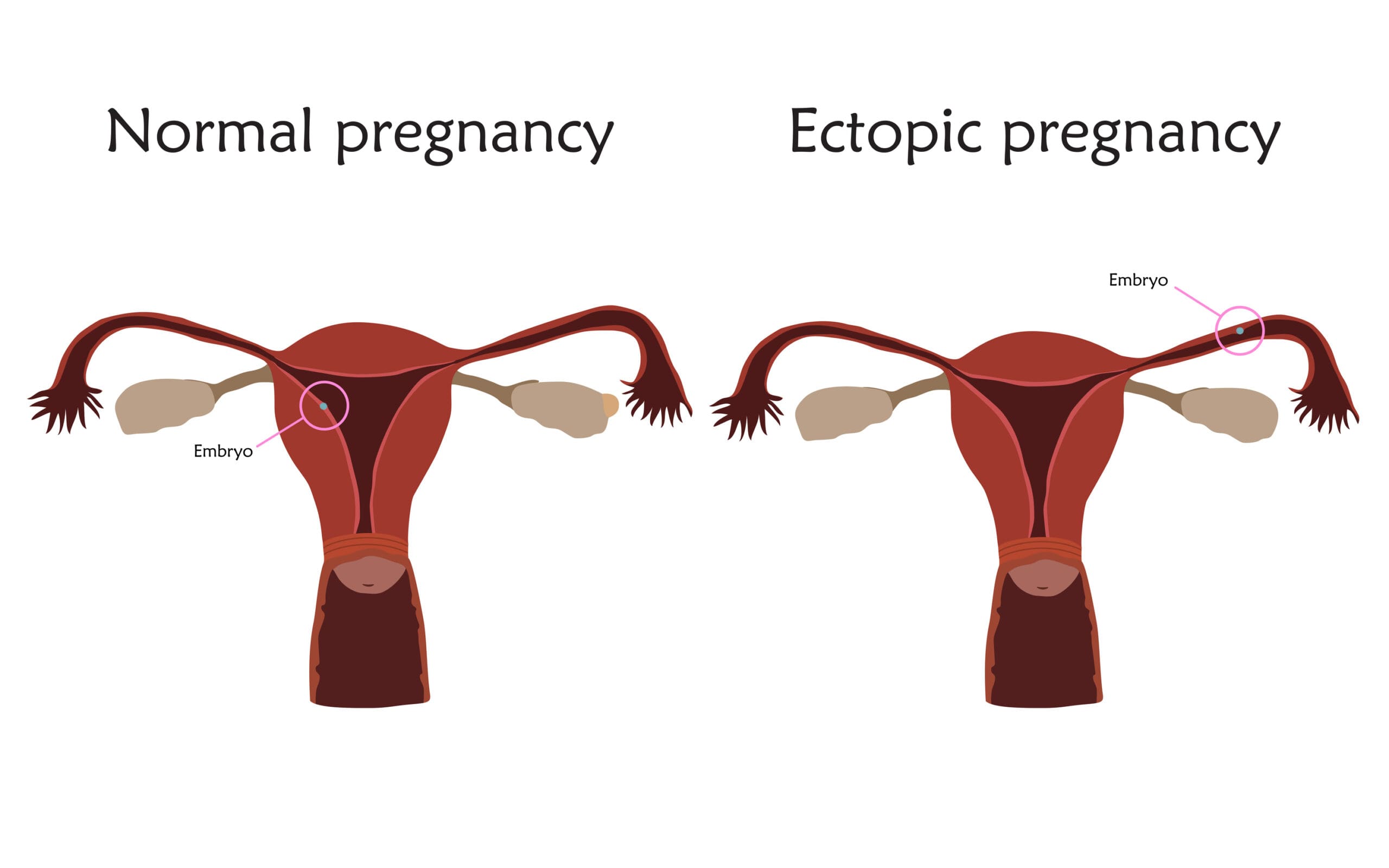If you’re considering the abortion pill, it’s crucial to understand the risks related to ectopic pregnancy. The abortion pill (mifepristone and misoprostol) is not effective in treating an ectopic pregnancy and taking it without knowing you have this condition can delay the urgent medical care you need.
That’s why it’s so important to get an ultrasound first, to make sure the pregnancy is in the right place. Your safety matters and knowing this ahead of time can help you make the best, most informed choice for your health.
What is an Ectopic Pregnancy?
An ectopic (or tubal) pregnancy happens when a fertilized egg implants and grows outside of the uterus, usually in the fallopian tubes. This is a rare but serious condition. The pregnancy cannot continue, and if left untreated, it can put the mother’s life at risk.
Normal vs. Ectopic Pregnancy
In a normal pregnancy, the fertilized egg moves through the fallopian tube and implants in the uterus, where it can grow.
In an ectopic pregnancy, the fertilized egg implants somewhere outside the uterus — most often in the fallopian tube – which isn’t designed to support a growing pregnancy. Without treatment, this can lead to dangerous complications.

Do ectopic pregnancies show on pregnancy tests?
No — you’ll still get a positive at-home pregnancy test if you have an ectopic pregnancy because the fertilized egg, no matter where it implants, produces hCG (the pregnancy hormone). That’s why a urine or blood test alone can’t tell you if the pregnancy is ectopic — the only way to know for sure is through an ultrasound.
Ectopic Pregnancy Ultrasounds
An ultrasound is the main way to check for an ectopic pregnancy. Around 6–7 weeks, an ultrasound can show whether the pregnancy is in or outside the uterus. If you’re early in pregnancy and have symptoms like sharp pain or heavy bleeding, an ultrasound can help figure out what’s going on.
At Southside Women’s Services we provide free ultrasounds. If we suspect you might have an ectopic pregnancy, we will help connect you to a local provider or nearest emergency room so you can get the care you need.

Ectopic pregnancy and Abortion
The abortion pill doesn’t work on ectopic pregnancies and taking it without knowing you have one can delay the emergency care you need. If an ectopic pregnancy goes untreated, it can rupture, leading to severe internal bleeding and putting your health — even your life — at serious risk. That’s why it’s really important to rule out an ectopic pregnancy before taking the abortion pill.
How common are ectopic pregnancies?
Ectopic pregnancies happen in about 2% of all pregnancies. While that’s not extremely common, it’s also not rare. Certain factors can raise your risk as well.
What are the risk factors?
You might be at higher risk for an ectopic pregnancy if you have:
- Previous ectopic pregnancy
- Sexually transmitted infections (STIs) like gonorrhea or chlamydia
- We offer free STI testing and treatment for women who might be pregnant.
- Scar tissue or inflammation in the pelvic region
- Fertility treatments
- Past tubal surgery
- An IUD for birth control
- A History of smoking
- Over the age of 35
Does your belly grow with an ectopic pregnancy?
No, not like a normal pregnancy. Because the pregnancy can’t develop properly, you typically won’t see a growing belly.
What are the common symptoms?
Some symptoms overlap with normal early pregnancy symptoms, but ectopic pregnancies can also cause:
- Vaginal bleeding
- Pain in your lower abdomen, pelvis and lower back
- Shoulder pain
- Dizziness or weakness

If the ectopic pregnancy ruptures, you may feel sudden, sharp pain in your lower abdomen. This is a medical emergency. You should go to the emergency room immediately.
What should I do if I suspect I have an ectopic pregnancy?
If you’re having severe pain or heavy bleeding, go straight to the emergency room. For other symptoms, contact your doctor as soon as possible. Ectopic pregnancy is the leading cause of pregnancy-related maternal deaths during the first trimester. Remember, only an ultrasound can tell if a pregnancy is ectopic.
How is an ectopic pregnancy treated?
Treatment options might include:
- A Methotrexate injection
- Surgical removal of the pregnancy tissue (salpingostomy)
- Surgical removal of the fallopian tube (salpingectomy)
- In some rare cases, close monitoring if there are indicators it might miscarry on its own
Medical treatments for tubal pregnancies are not the same treatments used for induced abortions. The pregnancy is not viable, and no amount of medical intervention exists to make it so.
Can an ectopic pregnancy be saved?
Unfortunately, no — an ectopic pregnancy cannot be saved or moved to the uterus. Because the fallopian tubes cannot sustain and grow the pregnancy, it will eventually rupture and become life-threatening for the mother, so it must be treated right away to protect her health and safety.
Get the Care You Deserve
At Southside Women’s Services we screen for ectopic pregnancy symptoms as part of our early pregnancy evaluation. If you think you might be pregnant, a pregnancy evaluation is the first step.
We care about you and your health. You are not alone.

